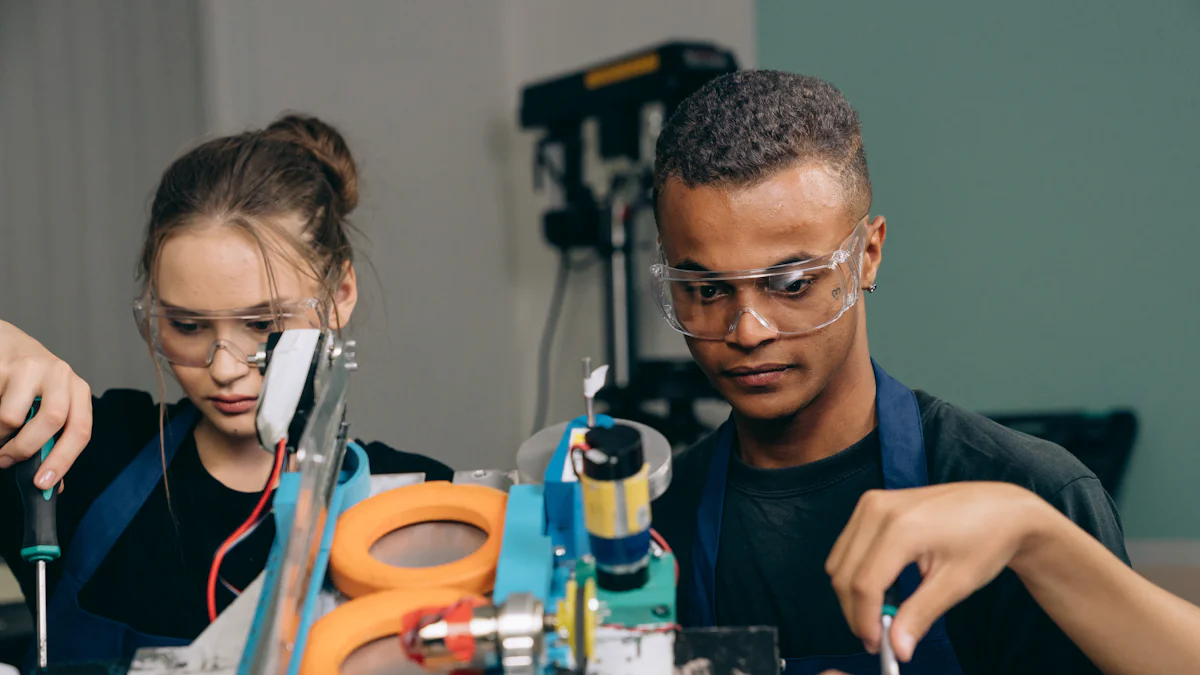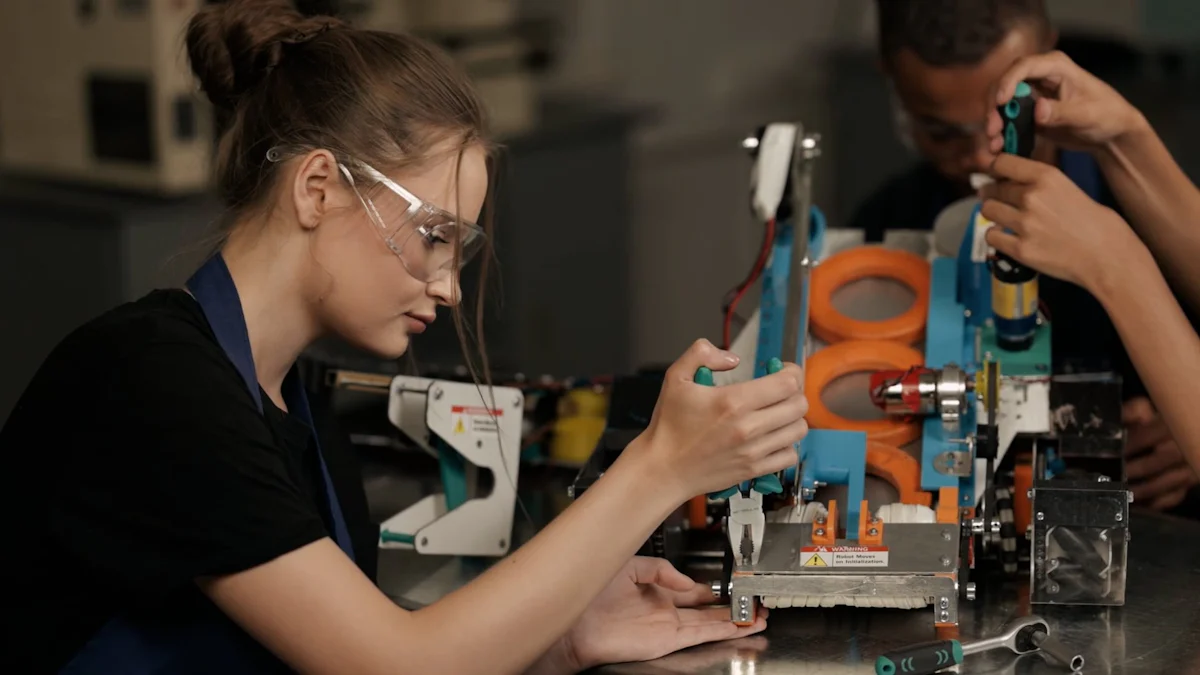How to Ace Your Omron Robotics Engineer Interview in 2025
Try Aihirely for
Smarter Interview Prep
Experience real-time AI support tailored to your Resume.
Boost your confidence and ace every question with
AI Mock Interview.

Image Source: pexels
Excelling in an Omron Robotics System Engineer interview can open doors to a rewarding career in robotics. Omron stands as a global leader in automation, with a legacy of groundbreaking innovations. Since 1933, they have revolutionized industries with inventions like the first non-contact proximity switch and high-performance smart cameras. These achievements highlight their commitment to advancing robotics technology.
To succeed, you must prepare thoroughly. Employers seek candidates who demonstrate technical expertise and a deep understanding of Omron’s values. Preparation helps you stand out and confidently tackle omron robotics system engineer interview questions.
Key Takeaways
-
Learn about Omron’s goals and values. Match your goals to theirs. Knowing they focus on robots working with people will make you stand out.
-
Study Omron’s products and new ideas. Knowing about their robots, like mobile and teamwork robots, will impress interviewers.
-
Learn basic robotics ideas like movement, control, and coding in Python and C++. These skills are very important for the job.
-
Get ready for behavior questions using the STAR method. Think about past times you solved problems or worked in a team.
-
Practice interviews to feel more confident. Answering technical questions during practice will help you do better in the real interview.
Research Omron Robotics

Image Source: pexels
Omron’s Mission and Values
Understanding Omron’s mission and values helps you align your goals with the company’s vision. Omron focuses on developing robots that assist humans in meaningful ways. Their mission emphasizes creating systems that foster human-robot collaboration. As a Robotics System Engineer, you will play a key role in designing these systems to improve efficiency and creativity.
Omron’s corporate philosophy states, “People should have time to partake in more creative fields of activity, leaving machines to do what they can.” This belief highlights the importance of automation in freeing humans from repetitive tasks. Your work will directly contribute to this vision by building robotic solutions that enhance human productivity and innovation.
Omron’s Products and Solutions
Omron offers a wide range of products and solutions in robotics and automation. Familiarizing yourself with these technologies will give you an edge during your interview. Below is a table summarizing some of their key offerings:
| Product Type | Description |
|---|---|
| Industrial Robots | Intelligent and programmable machines for automating repetitive tasks like assembly and inspection. |
| Autonomous Mobile Robots | Robots that can navigate and operate independently in a manufacturing environment. |
| Collaborative Robots (Cobots) | Robots designed to work alongside humans, enhancing productivity and safety in operations. |
In addition to these, Omron has developed innovative solutions such as:
-
OMRON Fleet Simulator: The first mobile robot simulator for factory applications.
-
AnyFeeder Solution: A flexible bulk part feeding system combining vision and robotics.
-
PackXpert Solution: An integrated packaging system that simplifies packaging line management.
These technologies demonstrate Omron’s commitment to advancing automation and robotics.
Recent Innovations and News
Staying updated on Omron’s latest advancements shows your genuine interest in the company. Omron recently celebrated 90 years of innovation, focusing on sustainability and human-machine collaboration. They introduced a high-performance smart camera with multi-color light and a SCARA robot equipped with predictive maintenance functions. These innovations enhance efficiency and reliability in industrial settings.
Omron has also integrated IoT into factory devices, supporting Industry 4.0. This integration improves collaboration between humans and machines, aligning with their vision of seamless automation. By understanding these developments, you can better connect your skills to Omron’s goals during your interview.
Understand the Role
Key Responsibilities of a Robotics System Engineer
As a Robotics System Engineer at Omron, you will take on diverse and impactful responsibilities. Your role will involve designing and troubleshooting control algorithms for servo systems. You will analyze and develop both analog and digital controllers using advanced techniques like S-domain and Z-domain modeling. These tasks require precision and a deep understanding of robotics principles.
You will also write motion control software using low-level C programming. This software will power robots to perform tasks efficiently and accurately. Supporting and testing these systems will be a critical part of your job. You will ensure that the robots operate seamlessly in real-world environments.
By mastering these responsibilities, you will contribute to Omron’s mission of creating innovative robotic solutions that enhance human productivity.
Skills and Qualifications for Success
To excel in this role, you need a strong foundation in robotics and programming. Below is a summary of the essential skills and qualifications:
| Skills and Qualifications | Description |
|---|---|
| Education | A BA/BS in Computer Science, Mathematics, Mechanical or Electrical Engineering is required. An MS is recommended, and a PhD is preferred. |
| Experience | 0-4 years of experience, with at least 2 years in C programming, robotics, or motion control applications. |
| Knowledge, Skills, and Abilities | Familiarity with system verification tests, digital filtering, Unix/Linux systems, and strong communication skills. |
| Personal Attributes | Self-motivation, teamwork abilities, and excellent organizational skills. |
These qualifications will prepare you to tackle the challenges of robotics engineering at Omron.
Typical Projects and Challenges
At Omron, you will work on groundbreaking projects like the Voyager Project. This initiative focuses on creating robots that can perform versatile tasks in non-industrial environments. It reflects Omron’s commitment to advancing robotics technology for human-robot collaboration.
You will also develop robots capable of dynamic movement and task optimization. These projects often involve solving complex problems in kinematics and human-robot interaction. For example, you might design systems that allow robots to handle repetitive tasks, freeing humans to focus on creative activities.
Another challenge includes creating robots with manual dexterity and flexible motion. These robots must operate safely in environments shared with humans. By addressing these challenges, you will help Omron achieve its vision of seamless automation and human-machine harmony.
Technical Preparation

Image Source: pexels
Core Robotics Concepts to Master
To excel in your Omron Robotics Engineer interview, you need a strong grasp of core robotics concepts. Start with kinematics, which involves understanding how robots move and position themselves in space. Learn about forward and inverse kinematics to calculate a robot’s end-effector position and joint angles. Dive into dynamics to understand the forces and torques acting on robotic systems.
Control systems are another critical area. Study PID (Proportional-Integral-Derivative) controllers, which are essential for maintaining stability and precision in robotic movements. Explore motion planning algorithms, such as A* and RRT (Rapidly-exploring Random Trees), to understand how robots navigate their environments. Additionally, familiarize yourself with sensor integration, which allows robots to perceive their surroundings and adapt to changes.
Omron values engineers who can apply these concepts to real-world challenges. Focus on practical applications, such as designing systems for autonomous navigation or collaborative robots.
Programming Languages to Focus On
Proficiency in programming is essential for robotics engineering. Below is a table summarizing the most relevant languages and their applications:
| Programming Language | Application in Robotics |
|---|---|
| Python | Scripting, data analysis, interfacing with industrial automation systems |
| C/C++ | Real-time control systems, custom interfaces for SCADA or DCS |
| Matlab/Simulink | Designing control algorithms and systems modeling |
| SQL/Database Languages | Data logging, trending, report generation in SCADA systems |
| Robot Operating System (ROS) | Framework for robot software development, uses Python and C++ |
| KUKA, ABB, Fanuc Languages | Proprietary languages for specific robots (e.g., KRL, Rapid, Karel) |
| MicroPython | Simpler embedded control and prototyping tasks in IoT applications |
| SciPy, NumPy | Control system analysis, simulation, and algorithm development |
Focus on Python and C/C++ for their versatility in robotics. Learn ROS to gain experience with a widely-used framework for robot software development. For control systems, Matlab/Simulink is invaluable.
Problem-Solving and Algorithm Design
Problem-solving is a key skill for robotics engineers. Start by understanding the structure of technical interviews. These often test your knowledge of data structures, algorithms, and time-space complexity. Master the fundamentals, including arrays, linked lists, trees, and graph algorithms.
Develop a clear problem-solving strategy. Use frameworks like the STAR method (Situation, Task, Action, Result) to structure your answers. Practice thinking aloud to communicate your thought process effectively. This approach helps interviewers understand how you tackle challenges.
Follow these steps to improve your problem-solving skills:
-
Practice solving robotics-specific problems regularly.
-
Reflect on your solutions and identify areas for improvement.
-
Familiarize yourself with Omron’s tech stack to tailor your approach.
-
Highlight your process over the final answer during interviews.
By focusing on these techniques, you’ll demonstrate your ability to solve complex problems and design efficient algorithms.
Behavioral and Soft Skills
Preparing for Behavioral Questions
Behavioral questions help interviewers understand how you handle real-world situations. These questions often focus on your past experiences and decision-making process. To prepare, reflect on your previous projects or roles. Identify moments when you solved problems, overcame challenges, or contributed to a team’s success.
Use the STAR method (Situation, Task, Action, Result) to structure your answers. For example, if asked about a time you resolved a conflict, describe the situation, explain your role, outline the steps you took, and share the outcome. Practice answering common behavioral questions, such as:
-
“Tell me about a time you faced a difficult technical challenge.”
-
“How do you prioritize tasks when working on multiple projects?”
These questions may also appear in your omron robotics system engineer interview questions. Clear and concise answers will leave a strong impression.
Tip: Keep your examples relevant to robotics or engineering to showcase your expertise.
Teamwork and Collaboration
Robotics projects often require collaboration with multidisciplinary teams. You must demonstrate your ability to work effectively with others. Highlight experiences where you contributed to a team’s success. For instance, discuss how you collaborated with software engineers to integrate control systems or worked with designers to optimize a robot’s functionality.
Show that you value diverse perspectives. Mention how you listen actively, share ideas, and resolve conflicts constructively. Employers want to see that you can adapt to different working styles and foster a positive team environment.
Note: Omron values teamwork as a core principle. Emphasizing this skill aligns you with their mission.
Leadership and Communication Skills
Strong leadership and communication skills set you apart. Even if you’re not in a managerial role, you can demonstrate leadership by taking initiative or mentoring others. Share examples where you led a project, delegated tasks, or motivated your team to achieve goals.
Effective communication is equally important. Robotics engineers must explain complex concepts to non-technical stakeholders. Practice simplifying technical jargon and tailoring your message to your audience. For example, describe how you presented a robotics solution to a client or trained a team member on a new system.
Tip: Strong communication ensures seamless collaboration and builds trust within teams.
Mock Interviews and Practice
Conducting Mock Technical Interviews
Mock interviews are one of the best ways to prepare for your Omron Robotics Engineer interview. They simulate the real interview environment, helping you build confidence and refine your responses. Start by identifying common technical questions related to robotics, programming, and control systems. Practice answering these questions with a friend, mentor, or even an AI-based interview platform.
Record your sessions to analyze your performance. Pay attention to how you explain your thought process and solve problems. Clear communication is just as important as technical accuracy. Use these mock interviews to practice thinking aloud, as this shows interviewers how you approach challenges.
Tip: Schedule multiple mock interviews to cover a variety of topics. This ensures you are well-prepared for different scenarios.
Solving Real-World Robotics Problems
Practical problem-solving is a key skill for robotics engineers. During your preparation, focus on solving real-world robotics challenges. For example, design a motion control algorithm for a robotic arm or create a navigation system for an autonomous mobile robot. These exercises help you apply theoretical knowledge to practical situations.
Use online platforms or robotics simulators to test your solutions. Tools like MATLAB, ROS, or Python-based simulators allow you to experiment with algorithms and refine your approach. Working on these problems also strengthens your ability to debug and optimize systems, which is a critical skill for Omron’s projects.
Note: Highlighting your experience with real-world problems during the interview demonstrates your readiness to tackle Omron’s complex challenges.
Iterating Based on Feedback
Feedback is essential for improvement. After each mock interview, reflect on the feedback you receive. Identify your strengths and weaknesses to adjust your strategies. AI-powered tools can provide instant feedback, helping you quickly pinpoint areas for improvement.
Create a continuous improvement plan to track your progress. Set specific goals, such as improving your explanation of control systems or refining your problem-solving speed. Use targeted resources like tutorials, books, or online courses to address gaps in your knowledge. Regularly review your progress to ensure consistent development.
-
Instant feedback accelerates learning and improvement.
-
Identifying strengths and weaknesses helps you adjust strategies effectively.
-
Consistent feedback enables you to track improvement over time.
-
Setting specific goals ensures focused and measurable progress.
Tip: Treat feedback as an opportunity to grow. Each iteration brings you closer to mastering the skills Omron values most.
Omron Robotics System Engineer Interview Questions
Common Technical Questions
Technical questions test your knowledge of robotics and problem-solving skills. You should expect questions that cover core robotics concepts, programming, and control systems. For example, an interviewer might ask, “How would you design a PID controller for a robotic arm?” This question evaluates your understanding of control systems and their practical applications.
You may also encounter questions about kinematics. A common question could be, “Explain the difference between forward and inverse kinematics.” This tests your ability to calculate a robot’s position and movement. Additionally, you might solve algorithm-based problems, such as designing a path-planning algorithm for an autonomous robot.
Prepare for coding challenges as well. You could be asked to write a program in Python or C++ to control a robot’s motion. Practicing these types of questions will help you feel confident during the interview.
Behavioral Questions to Expect
Behavioral questions focus on your past experiences and how you handle challenges. These questions often start with phrases like, “Tell me about a time when…” For example, you might be asked, “Describe a situation where you worked with a team to solve a technical problem.” This question helps the interviewer assess your teamwork and problem-solving abilities.
Another common question is, “How do you handle tight deadlines?” Your answer should demonstrate your ability to prioritize tasks and stay organized. You may also be asked about a time you failed and what you learned from the experience. Use the STAR method to structure your answers and provide clear examples.
Questions to Ask the Interviewer
Asking thoughtful questions shows your interest in the role and the company. You could ask, “What are the biggest challenges facing the robotics team at Omron?” This question helps you understand the team’s priorities and how you can contribute.
Another good question is, “What does success look like for a Robotics System Engineer at Omron?” This shows that you care about aligning your goals with the company’s expectations. You might also ask about recent projects or innovations, such as, “Can you share more about the Voyager Project and its impact on the industry?”
Tip: Avoid asking questions that can be easily answered by researching the company. Focus on topics that demonstrate your genuine curiosity and enthusiasm for the role.
Preparing for your Omron Robotics Engineer interview requires focus on technical skills, behavioral readiness, and company-specific knowledge. Each area plays a vital role in helping you stand out. Approach the interview with confidence and a mindset geared toward growth.
Tip: Treat every question as a chance to highlight your passion for robotics and problem-solving abilities.
This interview is more than a test—it’s your opportunity to demonstrate your expertise and enthusiasm for advancing automation. With preparation and determination, you can make a lasting impression. Good luck!
FAQ
What should you wear to an Omron Robotics Engineer interview?
Dress in business professional attire. A suit or blazer with a button-down shirt and formal pants works well. Avoid overly casual clothing like jeans or sneakers. Your appearance should reflect professionalism and respect for the opportunity.
How long does the interview process usually take?
The process typically takes 2-4 weeks. It includes an initial phone screening, a technical interview, and a final round with behavioral and technical components. Timelines may vary depending on the role and the number of candidates.
Do you need prior robotics experience to apply?
While prior robotics experience helps, it’s not always mandatory. Omron values strong programming skills, problem-solving abilities, and a willingness to learn. Highlight any relevant coursework, projects, or internships that demonstrate your potential to excel in the role.
How can you stand out during the interview?
Showcase your passion for robotics and automation. Research Omron’s products and values. Provide specific examples of your technical skills and problem-solving abilities. Ask thoughtful questions about the role and the company’s goals to demonstrate genuine interest.
What resources can help you prepare for the interview?
Use online platforms like LeetCode for coding practice. Study robotics concepts through books like Introduction to Robotics: Mechanics and Control. Explore Omron’s website and recent news to understand their innovations. Mock interviews with peers or mentors can also improve your confidence.
